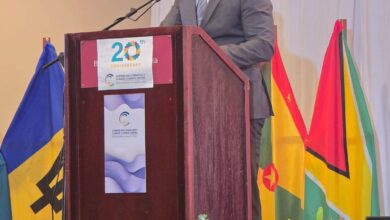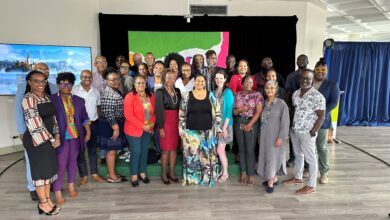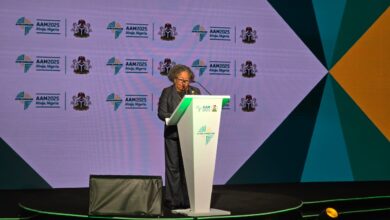(CARICOM Secretariat, Georgetown, Guyana) Monday, 13 December 2004 is a significant day for the Caribbean region in its fight against HIV/AIDS. On this day, the joint CARICOM/UNAIDS Secretariat publication: Common Goals, Shared Responses: A Case Study on the Pan-Caribbean Partnership Against HIV/AIDS – PANCAP will be launched at the Half Moon Hotel, in Montego Bay, Jamaica. This launch signals the Pan Caribbean Partnership Against HIV/AIDS (PANCAP) being officially designated an “international best practice” by the Joint United Nations Programme on HIV/AIDS (UNAIDS).
With the distinction of being one of the first and now “the only functioning multi-sectoral, multi-level regional AIDS partnership in the world”, PANCAP is the umbrella mechanism which brings together key partners working in the area of HIV care and prevention in the Caribbean region.
PANCAP Case Study
Formally created by the Pan Caribbean Partnership Commitment of 2001, and possessing a unique structure, the Partnership functions by encouraging partner organisations to work within their own mandates and areas of comparative advantage. It also assists partners to work in a harmonised and coordinated fashion to achieve the Partnership’s stated goal to “curtail the spread of AIDS and to reduce sharply the impact of [the disease] on human suffering and on the development of the human, social and economic capital of the region”.
“The Caribbean is the second most-affected region in the world. More than 440,000 people are living with HIV, and AIDS has become the leading cause of death among adults aged 15-44.” (AIDS epidemic Update: December 2004, UNAIDS)
The publication, Common Goals, Shared Responses details the evolution of the Partnership. It highlights the processes and activities related to the establishment of the entity, identifies achievements of and challenges to the Partnership, examines lessons learned and suggests a course for the way forward.
According to the latest estimates published by UNAIDS, close to 40 million people are living with HIV/AIDS globally, 4.9 million infected this year alone. As individuals and organisations the world over continue to seek ways to stem the tide of this epidemic, which does not discriminate against borders, race, colour, creed, gender or age, but threatens the whole of humanity, this publication could not be more timely.
In the words of Executive Director of UNAIDS, Dr. Peter Piot, “PANCAP is a model of a successful regional approach which can be a stimulus and a source of lessons learned for other regions.”
The joint CARICOM/UNAIDS’ Secretariats launch in Montego Bay follows closely a successful “Champions for Change” conference in St. Kitts November 22-24 hosted by CARICOM with the support of the United Kingdom Department For International Development (DFID). PANCAP was the driving force behind the conference which sought to, among other things, devise an action plan to reduce HIV/AIDS-related stigma and discrimination. This conference brought together representatives of governments, civil society, business, media, health workers, youths, persons living with HIV/AIDS, faith-based organisations, sports persons, musicians and other cultural icons, among others groups.
The press launch in Montego Bay and the publication itself constitute a critical validation of the success of PANCAP and underscores several vital components of the partnership, including: the Partnership’s wide range and extensive reach with more than 29 countries and over 70 partners; the harmonisation and coordination of policy and action; strong political commitment and leadership reflected by the very fact of it being chaired by a head of Government – the Prime Minister of St. Kitts and Nevis; as well as the strong support it continues to receive from a range of regional and international institutions.
Summarising the significant contribution PANCAP has made over its three years of existence, the publication declares that: “Since its establishment in 2001, PANCAP has raised the political profile of AIDS in the Caribbean region, mobilised significant new resources to fight AIDS, established the structure to facilitate collaboration, and has now embarked on the journey to concrete joint action for an accelerated response to AIDS.”
Expert Panel Discussion HIV Prevention and Gender
The launch of PANCAP as an international best practice” will be preceded by an expert panel discussion on HIV Prevention and Gender: Caribbean Perspectives, which will address the vulnerabilities facing women and girls in the Caribbean as well as the role of men in HIV prevention efforts.
According to UNAIDS, an increasing number of women are becoming infected with HIV in each region of the world.
“…a population-based survey carried out in 2002 [showed that] women under 24 years in the Dominican Republic were almost twice as likely to be HIV-infected compared with their male peers”. In Jamaica, teenage girls are 2.5 times more likely than boys in the same age group to be infected – due partly to the fact that some girls have sexual relationships with older men who are more likely to be HIV-infected, a trend that has also been documented in several other countries”. (AIDS epidemic Update: December 2004, UNAIDS)
In his statement on World AIDS’ Day, CARICOM Secretary-General Dr. Edwin Carrington, declared “…while we need to accelerate the fight against HIV/AIDS with great resolve, special attention must be paid to the plight of our women and girls.” Efforts, he said, must involve dealing effectively with sexual abuse and inequity in sexual relationships. Dr. Carrington called on the ‘Champions for Change’ emerging from the St. Kitts conference to “renew and expand [their] pledge as PANCAP partners to stamp out the spread of HIV/AIDS among women and girls.”
The Champions for Change conference had called for the enactment of appropriate legislation, regulations and other measures to eliminate all forms of discrimination, and to ensure the full enjoyment of all human rights and fundamental freedoms of PLWH/A, as well as members of all vulnerable groups in our communities. According to the statistics, HIV prevalence among vulnerable populations showed the highest levels of HIV infection among MSM, bi-sexuals and female sex workers.
In the Caribbean, “few countries have moved to legal protection of PLWHAs or vulnerable groups, MSM in particular, and HIV/AIDS related stigma and discrimination remains widespread”.
It is anticipated that the discourse of the panel of experts, which also draws from the Caribbean Technical Expert Group Meeting on Prevention and Gender convened by the Jamaica Health Ministry in collaboration with UNAIDS, in October this year, will not only provide food for thought, but also for much needed action.
The events on 13 December precede the 16th Meeting of the UNAIDS’ Programming Coordinating Board (PCB). It is the first time a meeting of the PCB is being held in the Caribbean.
UNAIDS, a founding PANCAP partner, has played a crucial role in broadening the Caribbean region’s response to AIDS and has actively promoted the idea of a truly multi-sectoral response to AIDS. It continues to demonstrate its unwavering commitment to the Caribbean region and to the fight against HIV/AIDS globally.
Contact: Volderine Hackett
Email : vhackett@caricom.org






